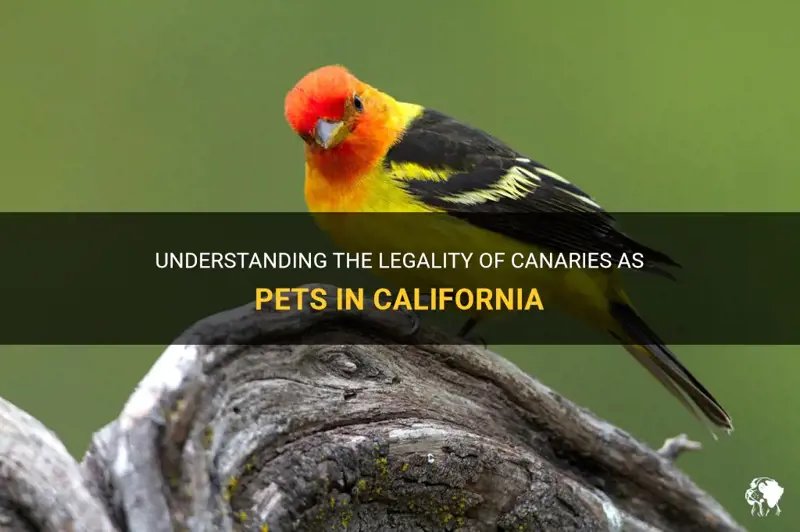
Now, imagine you’re sitting with your friend over coffee, and they ask if they can keep a canary. With a little knowledge, you can help them understand where it’s legal to own one and the different factors that come into play. Let’s break it all down together!
Understanding Bird Ownership Laws in the U.S.
First off, it’s essential to realize that bird ownership laws can vary widely from state to state. In the United States, there are no federal restrictions specifically prohibiting canaries. This means that, generally speaking, they are legal to own in most places. However, some states have specific regulations about bird ownership, especially regarding wildlife protection laws.
For instance, states like California have strict regulations regarding the importation of birds and may require permits. Local ordinances can also come into play, so it’s important to check your city or county rules. Imagine needing a map to navigate through different legal paths; that’s what checking local laws feels like.
In addition, homeowners’ associations (HOAs) often have their own rules about pet ownership, which could include restrictions on birds. These guidelines are created to maintain the community’s standards. So, even if it’s legal in your state, your HOA might have something to say about it!
Are There Restrictions Based on Species?
You might be wondering if all birds are created equal in the eyes of the law. While canaries are generally safe, some other bird species face stricter regulations. For example, exotic birds like certain parrots or finches might be illegal to own in some areas without special permits.
Many states classify birds under various categories, such as “native species” or “exotic species.” Native species, which can include some local finches, may require specific permits for ownership to protect the natural ecosystem. In contrast, canaries, which are domesticated and not considered native, often don’t have these restrictions.
If you’re curious about ownership specifics, it’s like checking labels on groceries. You wouldn’t want to buy something that’s expired, right? Likewise, understanding ownership categories can help ensure you’re compliant with the law.
Importing Canaries: What You Need to Know
Bringing a canary home from abroad? That’s a thrilling journey, but hold your horses—there are legal considerations here, too. Importing birds can be a complex process. The U.S. bans certain species to prevent diseases, so it’s crucial to understand the regulations in place when importing canaries from other countries.
When considering a canary from overseas, you’ll likely need to provide proof of health and require certain permits. The U.S. Fish and Wildlife Service has specific guidelines for importing avian species. It’s kind of like bringing a new friend into a group; you want to make sure everyone gets along and stays healthy!
Make sure to check the Animal and Plant Health Inspection Service (APHIS) for the latest regulations. Confirm that the canary you’re looking to import is eligible and that you have the necessary paperwork. This will save you from potential legal headaches later on.
Housing and Care Regulations
Owning a canary isn’t just about legality; it also involves ensuring your feathered friend has a suitable living environment. Some local laws dictate how birds should be cared for, including space requirements and housing standards.
Most importantly, you want to provide adequate space for the canary to fly and exercise. Think of it like a cozy apartment versus a cramped studio; a spacious cage allows your canary to feel more at home. If you want your canary to thrive, invest in one that meets these guidelines.
Additionally, consider the noise factor. Canaries are known for their singing, which is lovely but could pose an issue in noise-sensitive areas. If you live in an apartment, it’s best to check your building’s noise policies. After all, nobody wants to be the neighbor with the loud bird!
Health and Veterinary Regulations
You might be surprised to learn that some areas also have specific health regulations regarding pets, including birds. Regular veterinary check-ups for your canary can sometimes be legally required, or at least highly recommended. Just as you wouldn’t skip a doctor’s appointment yourself, your pet deserves regular health monitoring.
When you choose a veterinarian, ensure they specialize in avian care. An avian vet can provide tailored advice on your canary’s diet, habitat, and overall health. Plus, having a vet that’s knowledgeable about birds will help you navigate any local health regulations that might apply.
Even if your area doesn’t have strict health laws, it’s always best practice to keep your canary healthy. It’s like keeping your car in good shape to avoid unexpected breakdowns.
So, is it legal to own canaries everywhere? The short answer is that it mostly depends on where you live. Understanding the legal framework surrounding bird ownership can feel overwhelming, but it’s crucial for a smooth experience.
From checking local laws and possible HOA restrictions to ensuring proper housing and veterinary care, each step is essential in creating a happy home for your canary. Think of it as preparing to welcome a new family member; the more you know, the better you can provide for them.
If you’re in the clear, consider all the joy a canary can bring into your life. With the right research and preparation, you’ll be well on your way to enjoying the sweet sounds of your little feathered friend!

